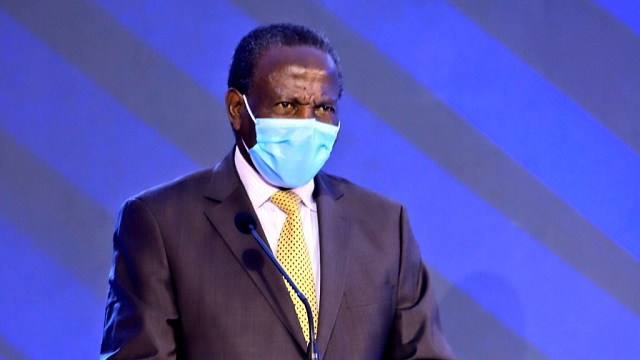
Kampala, Uganda | THE INDEPENDENT | The Minister of Finance Matia Kasaija has justified the budget cuts on the Parliamentary Commission, saying that it was necessary to help the country meet urgent Covid-19 medical needs.
According to Kasaija, the decision was taken by Cabinet to cut money appropriated for travel and workshops in all government entities. He said that reversing the decision would need the approval of the Cabinet.
“When Covid-19 invaded us, we had not budgeted for it. People were dying and the primary responsibility of any government is to preserve their lives. I would do anything, look for money for wherever to preserve life. What is the use of putting up a road, school railway when people are dying? Who are you doing it for?” Kasaija asked.
Kasaija was speaking on Friday at a sensitization meeting for Parliamentary journalists on the budget strategy for the coming financial year 2022/2023.
He said that all the budget cuts from different entities following a Cabinet decision were forwarded to the Ministry of Health to fight Covid-19. Kasaija says that complaints from parliament are not proper since also other entities were affected.
On Thursday, the Deputy Speaker of Parliament Anita Among complained about the Parliamentary Commission budget cuts saying that these have crippled the work of the House committees.
According to a Finance Ministry document, 24.56 Billion Shillings for workshops and travel abroad has been cut from the Parliamentary Commission budget for the financial year 2021/2022.
In total, the finance ministry has cut 203.41 billion from different government entities to reorganize government expenditure amidst the tough economic times caused by the COVID-19 pandemic.
The cuts affected the Office of the President (1.9 billion), State House (8 billion), Office of the Prime Minister (4.31 billion), Ministry of Defence (5.14 billion), Ministry of Finance (25.9 billion), Office of the Auditor General (3.9 billion), Makerere University (4.3 billion) Uganda Revenue Authority (8.8 billion), National Curriculum Development Centre (12.8 billion), Missions Abroad (11.6 billion) and others.
However, Among says that the Commission, the top administrative body of the House has now passed a resolution for the Executive to never interfere with the budgets of Parliament and the Judiciary since they are independent organs of government.
“One of the roles of parliament is appropriation and if there is anything to change in the budget, it must come back to the House. It is so disturbing that our committees can’t work. The other role is oversight, but when you find finance ministry cutting off money coming to parliament…it disturbs. If parliament cannot do an oversight role, then what are we left with…why are we here?” Among questioned.
She said that salaries for parliament have been delayed and that committees cannot perform their duties effectively with the cuts, and insisted that despite the different challenges that came with the outbreak of COVID-19, the operations of parliament should not be stifled.
Ramathan Ggoobi, the Ministry of Finance Permanent Secretary says that budget cuts are an instrument used by the government to direct the economy as well as the overall welfare of the people.
He said that in the future, the government will have a budget-driven by priorities.
Ggoobi said that what people are calling budget cuts is a budget rationalization to fit the country’s priorities which are keeping Ugandans alive, minimizing the Covid-19 effect and recovering the economy.
Ggoobi told journalists that there is a need to rationalize the budget and remove or reduce wastage so that every money spent has a good return on investment.
******
URN
 The Independent Uganda: You get the Truth we Pay the Price
The Independent Uganda: You get the Truth we Pay the Price



